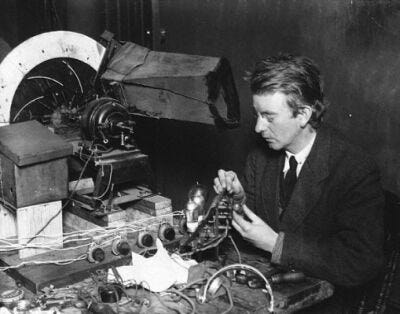Transatlantic TV
The Eye of the World
Today in 1928, John Logie Baird transmitted television pictures across the Atlantic, using a short-wave radio.
“The images were crude, imperfect, broken, but they were images none the less. Man's vision had panned the ocean; transatlantic television was a demonstrated reality, and one more great dream of science was on the way to realization.
The demonstration was made by the Baird Television Development Company of London, using short-wave radio sets for transmission of the ‘vision sound’ and the televisor invented by John L. Baird—who has also invented an instrument for seeing in the dark—for turning this sound back into vision after its ocean hop. The transformed vision of the man and woman in the London laboratory came through the ether in the form of a bumblebee's hum, a musical buzz or irregular cadence representing in sound the lights and shadows of their faces—all that was transmitted in the test”—The New York Times, February 9, 1928.
“His success deserves to rank with Marconi’s sending of the letter ‘s’ across the Atlantic – the first intelligible signal ever transmitted from shore to shore in the development of transoceanic radio telegraphy. As a communication Marconi’s ‘s’ was negligible; as a milestone in the onwards sweep of radio, of epochal importance. And so it is with Baird’s first successful effort in transatlantic television. .… Whatever may be the future of television, to Baird belongs the success of having been a leader in its early development”—The New York Times, February 11, 1928
The first worldwide live-streaming event over the internet was a radio live broadcast of a baseball game between the Seattle Mariners and the New York Yankees streamed by ESPN SportsZone on September 5, 1995.
Today, Netflix is the world's largest streaming TV network, with 231 million global paid subscribers.


